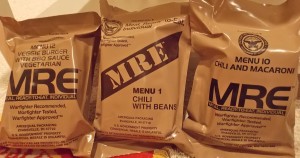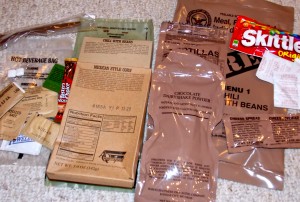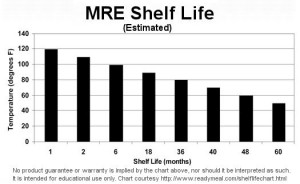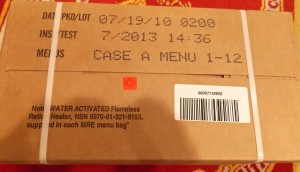 ‘Meals Refused by Everyone’ is a not-so-affectionate term for Meals Ready to Eat (MRE). MREs are the field rations that our military eats whenever they are out training or on military operations. Though some preppers have chosen to stock up on cases of MREs, there are many who have avoided MREs due to their mystery and the stereotype of bad military food. Having grown up with a step-dad who served in Vietnam (and into the 1980’s), I was pretty familiar with the old school military C-Rations, which came in cans and required the use of a small personal can opener. The only redeeming quality found in those early rations was the cardboard like caffeine-laden chocolate bar that I loved. But today’s MREs are not only much better tasting, but have a better variety of foods, and meet a rigorous nutritional standard.
‘Meals Refused by Everyone’ is a not-so-affectionate term for Meals Ready to Eat (MRE). MREs are the field rations that our military eats whenever they are out training or on military operations. Though some preppers have chosen to stock up on cases of MREs, there are many who have avoided MREs due to their mystery and the stereotype of bad military food. Having grown up with a step-dad who served in Vietnam (and into the 1980’s), I was pretty familiar with the old school military C-Rations, which came in cans and required the use of a small personal can opener. The only redeeming quality found in those early rations was the cardboard like caffeine-laden chocolate bar that I loved. But today’s MREs are not only much better tasting, but have a better variety of foods, and meet a rigorous nutritional standard.
 An MRE is made up of roughly 1300 calories: 169 grams of carbs, 41 grams of protein, and 50 grams of fat. Yes, that is a LOT of carbs and fat! But remember that this nutritional standard was designed for our military, classified as ultra-athletes, “exercising” in a combat environment. A typical MRE is made up of a: main course, side dish (fruit/vegetable usually), bread or snack item (pound cake, tortillas, crackers, candy, peanut butter, jelly, etc.), beverage of some sort (coffee, tea, kool-aid, an electrolyte-type drink, and/or hot cocoa), matches, gum, condiments, and a spoon.
An MRE is made up of roughly 1300 calories: 169 grams of carbs, 41 grams of protein, and 50 grams of fat. Yes, that is a LOT of carbs and fat! But remember that this nutritional standard was designed for our military, classified as ultra-athletes, “exercising” in a combat environment. A typical MRE is made up of a: main course, side dish (fruit/vegetable usually), bread or snack item (pound cake, tortillas, crackers, candy, peanut butter, jelly, etc.), beverage of some sort (coffee, tea, kool-aid, an electrolyte-type drink, and/or hot cocoa), matches, gum, condiments, and a spoon.
They come in a sealed plastic package and weigh 1.5 pounds. They also contain a “flameless ration heater”, a chemical pouch that heats up when activated with water, to heat your main course. The average service member only consumes about one or two of these a day, because they are just too dense to eat as three square meals. Also, most service members “field strip” their MREs down to the parts they know they are going to use to reduce their bulk.
 There are 24 MRE menus. The meals come in two case lots: menus 1-12 and 13-24 (and include specific vegetarian and religious meals). MREs are considered to be shelf stable for six months at 100 degrees and three years at 80 degrees (see side bar chart). There are two ways that packaging dates are listed on MRE cases: 1) A standard pack date (as shown in the photo of a military issued case) and 2) A numeric date, listing the last digit of the year followed by the Julian date of packaging (so my husband’s same
There are 24 MRE menus. The meals come in two case lots: menus 1-12 and 13-24 (and include specific vegetarian and religious meals). MREs are considered to be shelf stable for six months at 100 degrees and three years at 80 degrees (see side bar chart). There are two ways that packaging dates are listed on MRE cases: 1) A standard pack date (as shown in the photo of a military issued case) and 2) A numeric date, listing the last digit of the year followed by the Julian date of packaging (so my husband’s same  box is: 0200, meaning it was packed on the 200th day of 2010). Currently, the military uses three manufacturers for production of MREs: Wornick Company, SOPAKCO, and AmeriQual; I mention this because there are a lot of pseudo-MREs out there.
box is: 0200, meaning it was packed on the 200th day of 2010). Currently, the military uses three manufacturers for production of MREs: Wornick Company, SOPAKCO, and AmeriQual; I mention this because there are a lot of pseudo-MREs out there.
My husband unofficially rates MRE’s in three categories: good, okay and nasty. His “goods” include: chili with beans, beef ravioli, chicken with noodles, chili & macaroni, spicy penne pasta w vegetarian sausage. His “okays”: meatballs with marinara, cheese tortellini, beef patty, spaghetti with meat sauce. And his “nastys”: beef brisket and beef stew. These are his ratings, I’ll ask around in the next few months for some reviews by my husband’s troops. Personally, I find the spicy types of MREs to cause killer heartburn, and I wouldn’t want to be in the field without a good antacid! Though the meals claim to be balanced in the fiber department they need to be consumed with sufficient water, or they will literally leave you in a “bind”. But overall–as long as you are not eating more than two a day–they are a good, handy meal that certainly has a place in most preppers’ food storage and Bug-Out Bags.
Also of mention, the MRE heavy plastic pouch itself is extremely durable and can be used for holding/carrying water. While the packaging is not currently being recycled or made from recycled materials, the package does certainly have multiple uses that are only limited by the imagination. While serving in Somalia, my husband reported that the local children would salvage the packages out of the trash to be used as shingles on their homes.
The Operational Rations of the Department of Defense provides a pdf file that gives the entire background on MREs, and includes the complete menus for 2011 and 2012.
